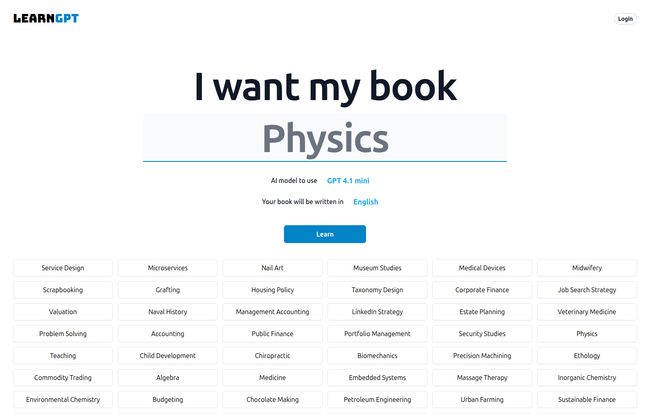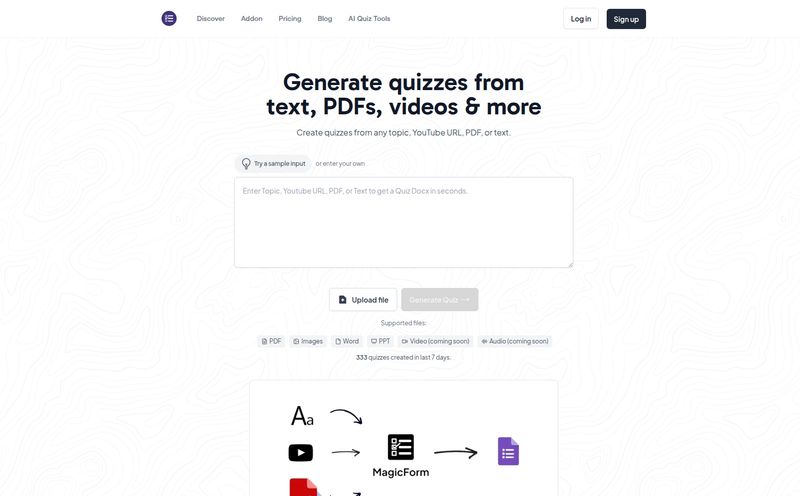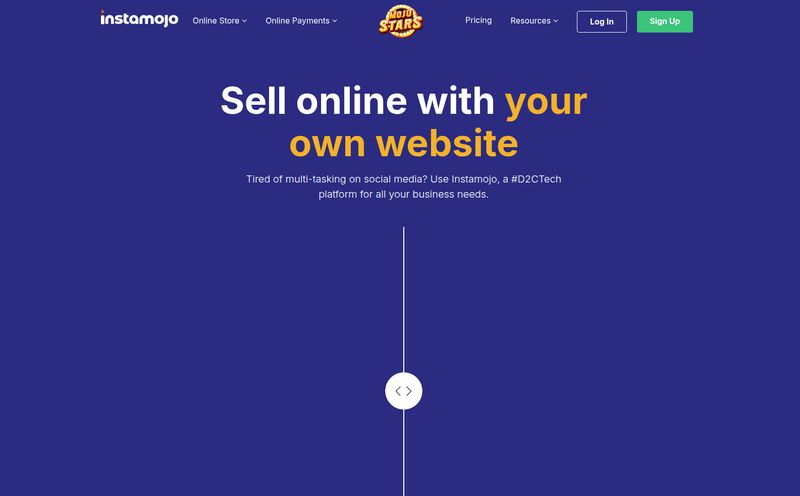You know those nights? The ones where you start with a simple Google search, maybe something like “how does blockchain actually work,” and four hours later you’re 17 tabs deep, reading a forum thread from 2011 about the best type of metal for forging medieval swords. Yeah, me too. That’s the beautiful, chaotic mess of curiosity-driven learning. It's fun, but man, is it inefficient.
For years, we've been trying to streamline this. We’ve got Wikipedia, YouTube tutorials, MasterClass, you name it. But what if you could just… ask for a book? A whole, structured book on literally any topic, generated just for you, right now. It sounds like something out of science fiction. But a new tool called LearnGPT is trying to make it a reality. And I have to say, I'm intrigued. And a little skeptical. So let's see if this thing is the real deal or just another shiny AI gimmick.
So, What on Earth is LearnGPT?
Okay, let's break it down. LearnGPT isn't a search engine. It's a generator. You go to their site, type a topic into a box, and the AI writes a book about it from scratch. Complete with chapters and everything. Think of it less like a library and more like a magical printing press that creates a custom textbook on demand. The promise is an effortless way to get a solid, foundational understanding of… well, pretty much anything you can think of.
My First Encounter With That Insane Topic List
When I first landed on the LearnGPT homepage, I genuinely laughed out loud. The main prompt is simple enough: “I want my book.” But below that… oh boy. It’s a tidal wave of topics. A wall of text that scrolls and scrolls, filled with the most wonderfully chaotic assortment of subjects I’ve ever seen in one place.
You’ve got deeply technical stuff like “Microservices” and “Quantum Physics” sitting right next to “Nail Art” and “Pottery Glazing.” It lists “Stand-up Comedy” just a few spots away from “Tax Planning.” I saw everything from “Food Preservation” to “Astrophysics” to “Cat Behavior.” It's a beautiful mess. It feels like someone emptied the entire curriculum of a massive university, a trade school, and a community art center onto a single page.

Visit LearnGPT
Honestly, this list alone is worth the visit. It’s a testament to the sheer breadth of human knowledge and interests. And it immediately tells you that the ambition behind this tool is massive.
The Good, The Bad, and The AI-Generated
Of course, a big list of topics is one thing. The actual output is what matters. So, how does it stack up? I’ve spent some time playing around with it, and my feelings are a mix of excitement and caution.
The Upside: The Magic of Instant Knowledge
The biggest pro here is speed. The experience is pretty seamless. You type in “Urban Gardening,” and within moments, you have a book with chapters like “Choosing Your Space,” “Container Gardening Basics,” “Soil and Fertilizers,” and “Common Pests.” It’s incredible for getting from zero to one on a new subject. Instead of piecing together 10 different blog posts and a YouTube video, you get a structured, coherent starting point. It's like having a knowledgeable friend give you a 30-minute crash course, but in written form.
Some Potential Drawbacks to Consider
Now for the reality check. This is still AI. And as anyone in the tech or SEO space knows, AI is only as good as the data it was trained on. There’s a risk of inaccuracies or outdated information. I wouldn’t use LearnGPT to write my doctoral thesis on nuclear fission, you know? It's generating content based on patterns in data, not from lived experience or primary research. For highly specialized or rapidly changing fields, you absolutely need to cross-reference the information with trusted sources. It lacks the nuance, the personal stories, and the deep, hard-won wisdom of a book written by a human expert who has spent 20 years in their field.
Here's a quick breakdown of how I see it:
| Aspect | My Take |
|---|---|
| Speed & Convenience | Amazing. You get a structured overview in seconds. Perfect for satisfying immediate curiosity. |
| Topic Breadth | Absolutely massive. From academic subjects to practical hobbies, it's all there. |
| Depth & Accuracy | This is the main weakness. It's a great starting point, but lacks the depth and verified accuracy of expert-written material. Always double-check critical facts. |
Who Is This Tool Actually For?
So, who should be using LearnGPT? I can see a few perfect use cases. It's a fantastic tool for students who need a quick primer on a topic before a lecture. It’s great for professionals who are changing fields and need to understand the jargon and basic concepts of a new industry fast. I’m thinking of a marketer who suddenly has to work with developers and wants to understand what “Agile Methodology” really means. It’s also brilliant for hobbyists who just want to explore something new without committing to buying a bunch of books.
The Big Question: How Much Does it Cost?
Here’s a fun little discovery from my time poking around. I couldn’t find a pricing page. Anywhere. I clicked on what I thought might be a link, and… I hit a 404 error page. “This page could not be found.” Honestly, I love when that happens. It’s a dose of reality. It tells me this is likely a project in its early stages.
So, as of right now, it appears to be completely free to use. Will that change in the future? Probably. Most tools like this eventually introduce a freemium model or a subscription. But for now, you can generate as many books as you want without pulling out your wallet, which is a huge plus.
The SEO and Content Creator Angle
Alright, putting my SEO hat on for a second. Could you use this to generate blog posts or content for your site? My strong advice is: no, not directly. Just copying and pasting AI content is a terrible idea. Google’s Helpful Content systems are designed to sniff out low-quality, unoriginal content, and you’ll likely do more harm than good to your rankings.
However, as a research and ideation tool? It’s fantastic. Let's say I have to write a pillar page about “Sustainable Finance.” I could use LearnGPT to instantly generate a book on it. I wouldn't use the text, but I’d look at the chapter titles. Those chapters are essentially a perfect outline for my article! It helps me understand the key subtopics I need to cover. It’s a powerful brainstorming assistant that can save hours of initial research. Think of it as a way to build the skeleton, which you then flesh out with your own expertise, research, and voice.
A Fascinating Tool with a Bright Future
So, what’s the final verdict on LearnGPT? It's not going to replace human authors, university professors, or deep-dive courses. And it shouldn't. But it’s not trying to. It’s a new category of tool. It’s a knowledge appetizer. An instant primer. It’s a way to scratch that intellectual itch immediately and get a structured overview of something new.
It’s a little bit of a gimmick, sure, but it's one of the most interesting and potentially useful AI gimmicks I've seen in a while. It’s a glimpse into a future where learning becomes even more accessible and on-demand. I, for one, am excited to see how it develops.
Frequently Asked Questions about LearnGPT
- What is LearnGPT?
- LearnGPT is an AI-powered platform that generates entire books, complete with chapters, on a vast range of topics. You simply input a subject, and the tool writes a structured book for you in moments.
- Is LearnGPT free to use?
- As of late 2023, LearnGPT appears to be completely free. There is no visible pricing page or subscription model, though this could potentially change in the future as the platform develops.
- How accurate is the information from LearnGPT?
- The information is generally a good starting point, but its accuracy depends on the AI model's training data. For critical, technical, or scientific information, you should always verify the content with other trusted, expert sources.
- Can I use LearnGPT for professional or academic research?
- It's best used as a preliminary research or brainstorming tool. It can help you create an outline or understand the basic concepts of a topic. It is not recommended for serious academic work or as a primary source due to potential inaccuracies and lack of depth.
- What kind of topics can I learn about?
- The range of topics is incredibly broad, covering everything from academic subjects like physics and history to practical skills like brewing and digital illustration, and even hobbies like stand-up comedy and nail art.
- Is the content generated by LearnGPT unique?
- The content is generated on-demand by an AI, so while it should be unique each time, it's built from existing data patterns. It's not advisable to use the content directly for publishing, as it lacks human oversight and could be flagged as AI-generated content by platforms like Google.
Reference and Sources
- Google's Stance on AI-Generated Content - An article from Search Engine Journal discussing the nuances of using AI for web content.
- OpenAI's Blog - For more background on the kind of large language models that likely power tools like LearnGPT.



